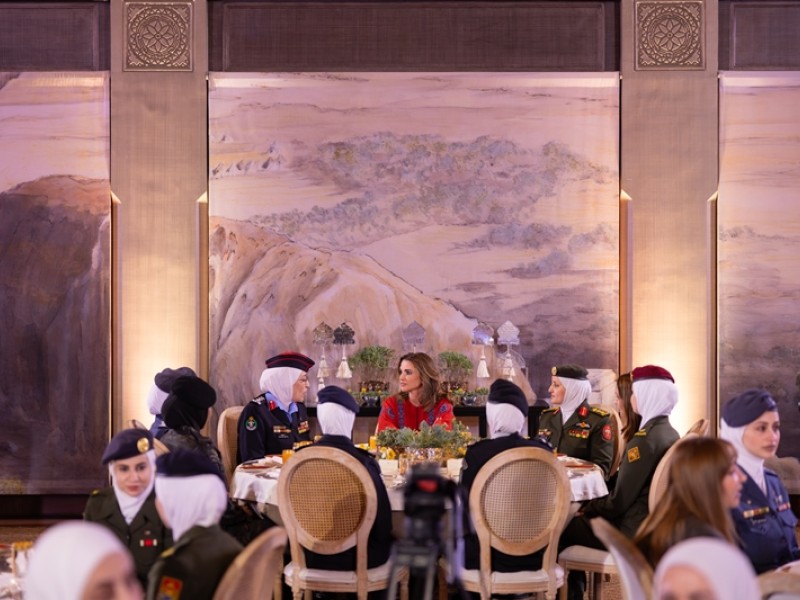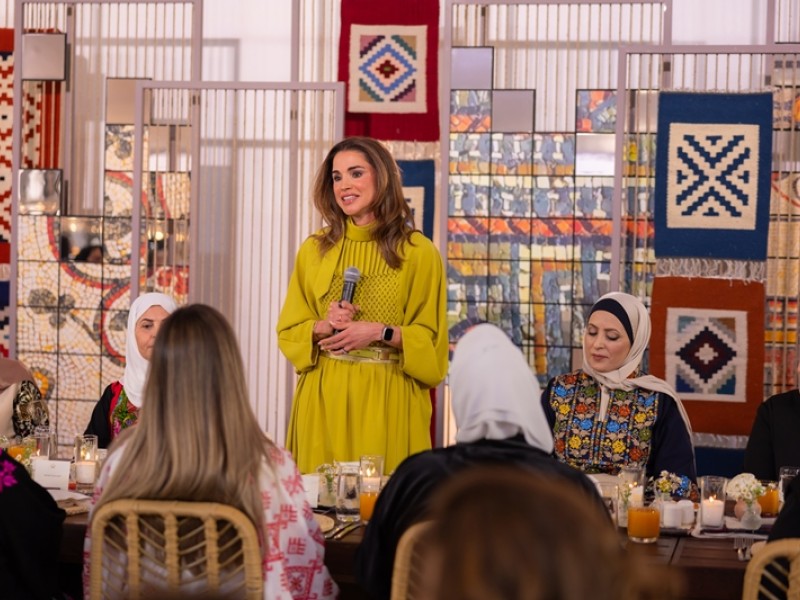Queen Rania Attends Official Handover of HLP Final Post-2015 Global Development Agenda Report to UN

(Office of Her Majesty- Press Department - NY) As a member of the United Nations High-level Panel (HLP) on post-2015 global development, Her Majesty Queen Rania Al Abdullah attended yesterday in New York the official handover to UN Secretary General Ban Ki-Moon of the panel's final report on its recommendations for the world’s next development agenda.
The report sets out a “universal agenda to eradicate extreme poverty from the face of the earth by 2030, and deliver on the promise of sustainable development,” the panel said in a statement issued in New York. The report calls upon the world to rally around a new Global Partnership that “offers hope and a role to every person in the world.”
In August 2012, the U.N. chief selected 26 members, including Her Majesty, to advise on the global development agenda beyond 2015, the target date for the expiry of the current set of Millennium Development Goals (MDGs). Queen Rania is one of two members representing the Arab World on the panel whose selection was in recognition of her efforts in the education, humanitarian and development fields.
"Besides capturing inputs from as many sources as possible, the most remarkable fact of this report is that we, the panelists and co-Chairs alike, were able to raise above national interest and address the Global Partnership and Sustainable Development issues with a true universal perspective,” HLP co-Chair President Susilo Bambang Yudhoyono of Indonesia, who handed the report to the U.N. chief, said in the statement.
The panel, which groups representatives of governments, the private sector, civil society and academia, said it interacted with more than 5,000 civil society groups from 121 countries in developing its recommendations.
In the report, the panel called for the new post-2015 goals to drive five big transformative shifts, including “leaving no one behind” to ensure that no person – regardless of ethnicity, gender, geography, race or other status – is denied basic economic opportunities and human rights.
The other transformative shifts, the panel noted, are to put sustainable development at the core; transform economies for jobs and inclusive growth; build peace and effective, open and accountable institutions for all; and forge a new global partnership based on a common understanding of our shared humanity, based on mutual respect and mutual benefit. The report, entitled “A New Global Partnership: Eradicate Poverty and Transform Economies through Sustainable Development”, can be viewed at www.post2015hlp.org.
“We hope it will stimulate debate over the prioritization that will be needed if the international community is to agree a new development framework before the expiry of the Millennium Development Goals,” the Panel’s co-chairs said in a May 30 letter to the U.N. Secretary General.
Since the appointment of the panel in August, Her Majesty has attended several HLP meetings focused on choosing human development goals priorities, highlighting what is missing from the current development agenda, and identifying how best to reach the poorest and most marginalized around the world. Queen Rania has also participated in several roundtable discussions led by youth who provided their perspective on issues such as health, education, and employment, and helped in identifying global challenges faced by youth to be included in the post-2015 agenda.
As part of the worldwide UN-led consultations on the global development agenda beyond 2015, Queen Rania attended several workshops and forums held in Jordan. Outcomes of each event were captured and submitted to the HLP and were fed into the panel's final report.
Among those forums, Her Majesty attended in February the National Forum on Education Relevance to the Workplace for youth in Jordan, sponsored by the UNESCO office in Amman, that brought together educators, student representatives, parents, civil society, government agencies, decision makers and U.N. officials. “I am proud that we in Jordan focus on constructive dialogue; how to build for the future, how to improve our situation and how to upgrade the educational process,” Her Majesty had told the forum.
In March, Queen Rania attended a two-day workshop in Amman on the Post-2015 Development Priorities for the Arab world that discussed the main regional development challenges and priorities where she said new strategies needed to be built and new goals set out based on the priorities of individuals, including development strategies that empower Arabs and keep up with their ambitions. This event was hosted by the United Nations Foundation in partnership with the King Abdullah Fund for Development and included participants such as leaders from civil society, research institutes and academia from Arab countries.
In April, the Queen opened the Regional Arab Development Forum in Jordan launched by the United Nations Development Group (UNDG). The two-day forum gathered around 200 participants representing civil society, academia, and the private sector from across the Arab region to both identify priorities and challenges as well as generate ideas towards national visions for the post-2015 development agenda.
HLP’s two other co-chairs are President Ellen Johnson Sirleaf of Liberia and Prime Minister David Cameron of the United Kingdom. Alongside Her Majesty, other members of the panel include former German President, Horst Kohler; Sweden’s Minister for International Development Cooperation, Gunilla Carlsson; Commissioner for Development for the European Commission, Andris Piebalgs; and Mexico’s Secretary of Foreign Affairs, Patricia Espinosa.
Featured
Queen Rania's official website
This website does not support old browsers. To view this website, Please upgrade your browser to IE 9 or greater
Your browser is out of date. It has known security flaws and may not display all features of this and other websites. Learn how to update your browser



